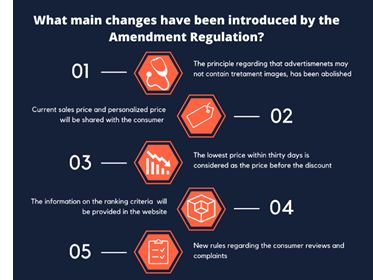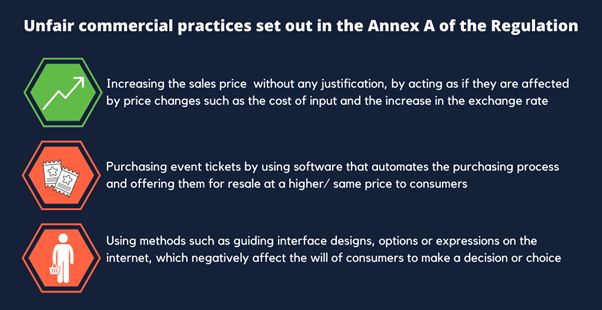The Turkish Ministry of Trade has recently amended ("Amendment Regulation") the Commercial Advertisement and Unfair Commercial Practices Regulation ("Regulation")1. The Amendment Regulation has been published in the Official Gazette2, and its provisions will come into force by March 2022.
As provided in Article 1 of the Regulation, the purpose of the Regulation is (i) to determine the principles to be followed by advertisers, advertising agencies, media organizations, and all persons, institutions and organizations engaged in commercial practices related to advertising; (ii) to determine the principles of assessments within this framework, and (iii) to protect consumers against unfair commercial practices.
While the Amendment Regulation introduces some new rules in line with the latest developments in trade, it is still unclear whether some of these changes are economically practical. Accordingly, this article aims to illustrate the main changes introduced by the Amendment Regulation and our assessment concerning the execution of amended provisions.
Main Changes Introduced by the Amendment Regulation

Whereas the main principles of the advertising are set forth within Article 5 of the Regulation, the Amendment Regulation has abolished the principle concerning that "The advertisements shall not contain expressions or images of patients before and after treatment." Considering that the treatment images are regarded as sensitive personal data in terms the Turkish Data Protection Law, we think that the omitted principle was in line with the personal data protection law and the ban on advertising by doctors. Yet, the reason for removing this principle from the Regulation is unclear.
Furthermore, the Amendment Regulation has added a sub-paragraph to Article 13 titled "Advertisings including information of price" stating that:
"The price offered by analysing the purchasing behaviour and other consumer personal data regarding a good or service is considered a personalized price. Provided that such price is offered to the consumer, the information regarding this scope and the current sales price and personalized price determined by the seller or supplier for that good or service shall be included in the same field."
As a result of the relevant amendment, the undertakings will no longer be able to implement price discrimination practices easily. Indeed, it will be difficult to apply a higher price to the consumers with low demand elasticity and a lower price to consumers with high demand elasticity since both the current sales price and the personalized price will be identifiable by the consumer.
Following that, the Article 14/3 of the Regulation has been changed to "In the determination of the sales price of a good or service before the discount, the lowest price within thirty days before the discount is taken into consideration.", whereas the original text provided that the price before the discounted price is taken as a basis.
The said provision also sets forth that the advertisers bear the burden of proof. In that respect, it is considered that such an obligation will increase the monitoring costs of the sellers and suppliers. As a result, an increase in the transaction cost is expected as well.
In addition, Article 6 of the Amendment Regulation adds the following provision to the Regulation:
"In the event of ranking by comparing the price, quality and similar aspects of a good or service offered for sale on the internet, the information on the ranking criteria shall be placed in the same field or in a way that can be easily seen on the pop-up screen where consumers can be directed and receive detailed information with a link or warning sign."
However, there are some ambiguities with the said provision, as it does not clarify how detailed information the seller should provide. While providing insufficient information may lead to non-compliance, giving too much detail on the ranking criteria may result in a free-riding problem, especially considering that the ranking may be operated through the website's algorithms.
Lastly, the Amendment Regulation provides elaborative rules regarding the consumer reviews and complaints within the scope of Articles 28/B and 28/C. However, it may be considered that these rules may have detrimental consequences on the customer complaint websites because the rules obliged the complaint websites to communicate with the sellers or suppliers without requiring any subscription.
What Other Changes Does the Amendment Regulation Provide?
Further to the changes mentioned above, the Amendment Regulation stipulates the following:
- In advertisements related to financial services, consumers should be directed to a website where they can access information about the details of the financial service (amending Article 25 of the Regulation);
- Advertisements related to pharmaceutical products, human medicinal products, medical devices, health services, foods, supplements, cosmetics and hygiene products, biocidal products, tobacco products, and alcoholic beverages should also comply with provisions regarding advertising and promotion in other relevant legislations (amending the Article 26 of the Regulation);
- Advertisement Board may publish guidelines (amending as Additional Article 1 of the Regulation);
- Increasing the sales price of the goods or services offered to the consumer without any justification, by acting as if they are affected by price changes such as the cost of input and the increase in the exchange rate, has been removed from the list of unfair commercial practices (amending the Annex A of the Regulation);
- On the other hand following practices have been added to the list of unfair commercial practices (i) purchasing event tickets such as sports, theatre, and talk shows outside the specified limits by using software that automates the purchasing process and offering them for resale at a higher/ same price to consumers; (ii) using methods such as guiding interface designs, options or expressions related to a good or service on the internet, which negatively affect the will of consumers to make a decision or choice, or which aim to cause changes in favour of the seller or provider.

Conclusion
Although the Amendment Regulation has been introduced to protect the consumers, it should not be forgotten that the regulations should be economically practical for the undertakings and should not create additional costs in the current challenging market conditions. Following its entry into force on March 1, 2022, the difficulties in executing the Amendment Regulation will become observable.
Footnotes
1. The Regulation can be accessed at the following link: https://www.mevzuat.gov.tr/mevzuat?MevzuatNo=20435&MevzuatTur=7&MevzuatTertip=5 (last accessed on February 9, 2022)
2. The Amendment Regulation can be accessed at the following link: https://www.resmigazete.gov.tr/eskiler/2022/02/20220201-6.htm (last accessed on February 9, 2022)
The content of this article is intended to provide a general guide to the subject matter. Specialist advice should be sought about your specific circumstances.



